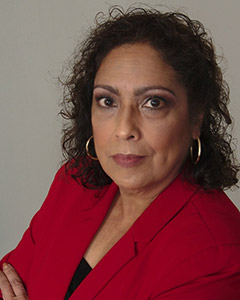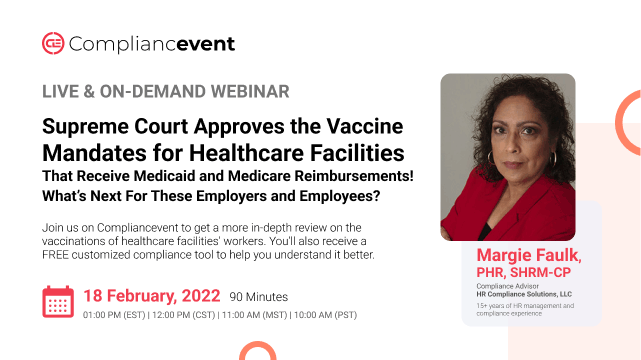- Topics
- Webinars
- Products & Services
Welcome To Biggest Online compliance Platform By LOCGFX Pvt. Ltd.
Healthcare
The Supreme Court determined that the Center for Medicaid and Medicare Service (CMS) had the statutory authority to impose the vaccination rule in an effort to ensure that the healthcare providers who care for Medicare and Medicaid patients protect their patients’ health and safety.
The Court also rejected the procedural challenges to CMS’ adoption of the rule. Enforcement on Phase 1 of the vaccination rule’s implementation is now slated to begin Jan. 27, 2022, with all staff to be vaccinated thereafter, although CMS is expected to issue the updated guidance and could extend the current deadlines.
In the CMS case, the Supreme Court explained that the federal government has the authority to impose conditions in connection with funding for public programs, such as Medicare and Medicaid. The Court noted that longstanding health and safety conditions of participation and other standards set by CMS regularly impose requirements on providers and suppliers as a condition to receiving Medicare and Medicaid reimbursement. The Supreme Court noted that the “vaccine mandate goes further than what [CMS] has done in the past to implement infection control” but CMS “has never had to address an infection problem of this scale and scope before.”
Providers and suppliers enrolled in Medicare and Medicaid should determine if CMS’ vaccination rule applies to them. The rule only applies to 15 provider and supplier facility categories with health and safety conditions of participation (or similar requirements).
The Court’s opinion means that, in order to receive Medicare and Medicaid funding, participating facilities covered by the interim rule must ensure that their staff, unless an exemption has been both requested, and approved for medical or sincerely held religious reasons, must receive a COVID-19 vaccine.
The injunctions previously in place covering 25 states are now lifted. While the Court’s ruling only addresses the injunctions and not the actual merits of the challenges to the mandate itself, the opinion makes abundantly clear that the Court views the mandate as statutorily lawful.
Some Medicare and Medicaid providers and suppliers with high vaccination rates may welcome the ruling as an incentive for the remaining staff to become vaccinated. However, entities with low vaccination rates are likely worried that the mandate will cause holdouts to resign – leaving insufficient numbers of staff to continue normal operations.
Join us on Compliancevent to get a more in-depth review of the vaccinations of healthcare facilities' workers. You'll also receive a FREE customized compliance tool to help you understand it better.
The health-care mandate, which applies to about 17 million workers, covers medical settings from doctors’ offices and dialysis centers to nursing homes and hospitals. Health-care employers covered by the federal Centers for Medicare & Medicaid Services must begin complying by Jan. 27.
By then, all healthcare staff who do not qualify for a medical or religious exemption must have received at least one dose of a covid vaccine. Facilities with an 80% vaccination rate by that date can avoid penalties if they have a plan to achieve 100% within 60 days. By Feb. 28, health care staff must be fully vaccinated. HHS will begin enforcement on March 28.
Enforcement can include civil monetary penalties, denial of payments, and—as a final measure—termination of participation from the Medicare and Medicaid programs.
-Learn what Employers of these CMS require facilities to ensure compliance with this mandate.
-Learn how creating a Vaccine Mandate Policy will be critical to preparing employees for the vaccine mandate
-Learn what the deadlines are for healthcare employees to be vaccinated before enforcement kicks in
-Learn what the reasonable accommodations are allowed for vaccine exemptions and how the track these requests
-Learn how communication of these requirements are a key component to the implementation
-Learn how patients can feel confident about the vaccine mandates to keep them safe
-What happens if healthcare workers refuse to get vaccinated?
-Some employers believe that they will risk losing healthcare works who are opposed to the vaccine mandate as they see labor shortages
-Employers have to ensure they develop a policy for handling vaccine exemptions based on a reasonable accommodations process.
-To prepare for the deadlines, Employers will need to survey their employees to assess who is not vaccinated to create a strategy that will focus on how they can get all employees vaccinated
-Employers should have a training component for their managers and employees to ensure that they are all on the same page.
-All Employers who receive reimbursement from Medicare or Medicaid
-Healthcare Facilities
-Nursing Homes
-Hospice
-Company Leadership
-Compliance professionals
-HR Professionals
-Managers/Supervisors
-Office Managers
-Small Business Owners

Margie Faulk is a senior level human resources professional with over 15 years of HR management and compliance experience. A current Compliance Advisor for HR Compliance Solutions, LLC, Margie, has worked as an HR Compliance advisor for major corporations and small businesses in the small, large, private, public, Non-profit sectors and International compliance. Margie has provided small to large businesses with risk management strategies that protect companies and reduces potential workplace fines and penalties from violation of employment regulations. Margie is bilingual (Spanish) fluent and Bi-cultural. Margie’s area of expertise includes Criminal Background Screening Policies and auditing, I-9 document correction and storage compliance, Immigration compliance, employee handbook development, policy development, sexual harassment investigations/certified training, SOX regulations, payroll compliance, compliance consulting, monitoring US-based federal, state and local regulations, employee relations issues, internal investigations, HR management, compliance consulting, internal/external audits, and performance management. Margie’s unique training philosophy includes providing free customized tools for all attendees. These tools are customized and have been proven to be part an effective risk management strategy. Some of the customized tools include the I-9 Self Audit. Correction and Storage program, Ban the Box Decision Matrix Policy that Employers can provide in a dispute for allegations, Family Medical Leave Act (FMLA) Compliance Guide, Drug-Free Workplace Volatile Termination E-Book and other compliance program tools when attendees register and attend Margie’s trainings. Margie holds professional human resources certification (PHR) from the HR Certification Institution (HRCI) and SHRM-CP certification from the Society for Human Resources Management. Margie is a member of the Society of Corporate Compliance & Ethics (SCCE).
Compliancevent Webinar Certification - Compliancevent rewards you with Compliancevent Achievement Certification for unlocking and attending this webinar. It is to acknowledge your participation in this training session and to add more to your professional score.
Compliancevent Courses and Webinars or any Education published "Articles & Materials" strictly follows the standards and guidelines of the Professional Credit / CEU Providers and Well Researched before publishment.
Compliancevent doesn't support any Fake - News, Articles, or Compliance updates; Our Industry Experts are highly verified and recognized, and their Pre-publishment is verified via our experts and fact-checkers.
Sign up now on compliancevent.net. Visit compliancevent.net/webinar to discover a wide range of webinars from industry specialists. Tick on either ‘live webinar’ or ‘on-demand’, and simply click on ‘buy now’ to get enrolled.
You can refer compliancevent to anyone in your social circle. Explore your industry with your colleagues by getting them signed up on compliancevent.net today!
Go for the topic of your keen interest on compliancevent.net. Tick on ‘live webinar’ and get enrolled! Easy registration, transparent transaction.
You can request for an on-demand webinar that records the live webinar for you. After the webinar ends, you will have full access to the webinar’s recording. You can also explore compliancevent offline to order your webinar DVDs, flash drives and transcripts.
If you can’t attend the live webinar, simply go for the ‘on-demand webinar’ for the same price! Now, the live webinar recording will be saved in a cloud storage for you to access anytime from anywhere.
compliancevent offers both hard and soft copies of the webinars. It contains all the highlights as well as comprehensive descriptions of the webinar, so you never miss out a single detail.
After attending the live webinar, your certificate will be emailed to you. You can download it and add more charm to your professional score.
At the end of each webinar, you have the opportunity to interact with your industry experts, where you will get answers to all your queries.
Can’t attend the live webinar? compliancevent has got you covered! You can always switch to the on-demand webinar from your portal. You can also get your hands on the webinar’s DVD/flash drive and transcript. So order them now!
compliancevent brings a variety of options for offline learning. Order your DVDs, flash drives or transcripts now to have a lifetime access to compliancevent webinars. You can also go for on-demand recordings. Download and watch it anytime from anywhere in the world!
